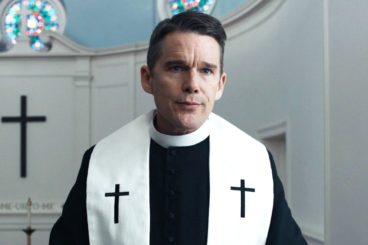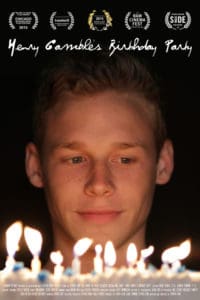
Editor’s Note: This review contains spoilers.
The movie First Reformed, written and directed by Paul Schrader, is a stunning, profound, and haunting story about faith, despair, decay, death and the apparent absence of God. Reverend Ernst Toller (Ethan Hawke) is a pastor of First Reformed Church in upstate New York. His church is about to celebrate its 250th anniversary. Other than its historic significance, there is very little to celebrate. Like in many historic churches, the numbers of members are dwindling. No more than a dozen people attend services, and the church is more of a museum and a tourist stop than an assembly of believers.
The only reason why the building is not a parking lot is because the nearby Abundant Life Church, with 5,000 members, an active youth group, and a state-of-the-art corporate-sponsored recording studio, subsidizes it. The contrast between the two churches could not be more stark. In an age when the success of ministries is measured by numbers and programs, First Reformed Church is clearly dying.
And so is Toller—literally and spiritually. Cancer is rapidly eating away at his body, and he is spiritually decaying as well. He is full of doubt, and he questions the point of his life and work. His life’s work as a pastor seems pointless. Coming from a family with a long tradition of joining the military, he was previously a military chaplain, and had encouraged his son to enlist in the army. Six months later, that same son was dead in Iraq.
At one point in the film, Toller confesses, “I talked my son into a war with no moral justification.” As a result of his son’s death, Toller left the military and his marriage fell apart. After the catastrophe, Joel Jeffers (Cedric Kyles), pastor of the Abundant Life Church, granted Toller the pastorate of the First Reformed Church as an act of charity. Though he appreciates the kindness of Jeffers and the Abundant Life Church, Toller can’t help but resent their patronizing benevolence.
“I talked my son into a war with no moral justification.”
Outwardly, Toller is a man of quiet and stoic restraint. Within, his soul struggles with grief, doubt, and despair. He has lost his family, and his faith in both the military and his nation. His ministry is more of a tourist attraction than a church. The church itself is like the many tombstones that surround the building—an inert and pleasant memorial, an ornament of the past that can be easily ignored and dismissed. It is neither useful nor relevant.
Toller’s faith, ministry, and life feel impotent. He writes in his journal, “…if only I could pray,” but he cannot bring himself to do so. He feels betrayed and abandoned by both God and the world.
But, he has not entirely given up. He notes that even the desire to pray is a form of prayer. He remarks that those who are flippant about praying are those who have never prayed. Toller’s spiritual struggles remind me of Paul Tillich’s belief that “if you are desperate about the meaning of life, the seriousness of your despair is the expression of the meaning in which you are still living. This unconditional seriousness is the expression of the presence of the divine in the experience of utter separation from it.”
By contrast, the culture (and many churches) are preoccupied with the superficial gratification of appetites. Toller is introspective and contemplative. He struggles to find meaning and purpose.
Toller finally encounters purpose and meaning when Mary (Amanda Seyfried), one of his few parishioners, asks for help. Her husband Michael (Phillip Ettinger) is depressed and disturbed, and Toller agrees to meet with him. Michael is an environmental activist who has concluded that the world will become unlivable in a few decades. He says, “Opportunistic diseases, anarchy, martial law, you will live to see this.” Toller counsels Michael not to give in to despair or to abandon hope. They agree to continue to meet. The next day, Mary discovers that Michael has constructed a bomb vest, and Toller takes it away. The following day, Toller discovers Michael’s body in a park. He had committed suicide by shooting himself in the head.
“Can God forgive us for what we’ve done to this world?” The church is complicit in the destruction of creation.
In the following months, Toller develops an affectionate relationship with Mary while simultaneously being haunted by Michael’s warnings about the coming environmental catastrophe. Before he died, Michael asked Toller, “Can God forgive us for what we’ve done to this world?” Toller continues to ask himself that question. He sinks into a deeper depression when he discovers that Edward Balq (Michael Gaston), the owner of a corporation that is one of the largest environmental polluters in the world, is a member of Abundant Life Church. Balq funds both the Abundant Life Church as well as the First Reformed Church building. The church is complicit in the destruction of creation. Toller himself is complicit. When Toller attempts to confront Balq and speak prophetically, Jeffers shuts him down. Jeffers argues that Toller lives in a fantasy world. A large and thriving ministry, a mega church, requires the patronage of men like Balq. The church must turn a blind eye, or be blind, in order to thrive.
During a ceremony to reconsecrate the First Reformed Church building, Toller plots to use Michael’s explosive suicide vest to kill Balq and others who are complicit in the sin of the destruction of creation. However, when he sees Mary entering the church, he cannot go through with the plan. He will not kill Mary. He takes off the explosive vest and instead wraps his body in barbed wire. Right before he drinks a cup of Liquid Drano, Mary enters the room and calls out his name. He drops the Drano, and Mary and Toller embrace and kiss. Then the movie, suddenly, ends.
Schrader’s film raises provocative questions about faith and provides very few simple or clear answers. It is complicated, but not nihilistic.
Schrader’s film raises provocative questions about faith and provides very few simple or clear answers. It is complicated, but not nihilistic. The film is littered with hints and suggestions. Let me offer a few reflections here, with the understanding that the film contains far more rich and complex ideas than can be contained in one short review.
Toller blames himself for his son’s death and the destruction of his marriage. When Michael asks Toller if God can forgive humanity for destroying the environment, Toller responds, “Who can know the mind of God?” One could also ask Toller if God can forgive Toller for sending his son to his death. Toller would presumably give the same reply.
Toller cannot forgive himself, so he is working out his penance. He lives an austere life, eschewing any beauty or pleasure. His home is stark, with only minimal furnishings and no decorations. His diet consists of toast soaked in whiskey. He knows that he is terribly ill, but he avoids medical treatment, as if he wants to hasten his own death.
Jeffers challenges Toller, saying that Jesus spent one night in the Garden of Gethsemane, but Toller insists on living in the Garden. God offers healing and mercy. Toller rejects it. By the end of the movie, Toller plots to commit suicide and mass murder in an attempt to save the earth from an environmental apocalypse. When he abandons that plan, he wraps his body in barbed wire and then seeks to poison himself to atone for his own sins.
To be clear, I am not suggesting that Christians resign from their duties and abdicate responsibility by hiding behind a self-absorbed spirituality. But, I would point out, saving the world and atoning for sins is ultimately the work of God, not of humans. Toller rejects the sacrifice and mercy of Christ.
Perhaps Toller does not think he deserves mercy. That, though, is a form of pride. Engaging the world takes courage. Accepting the power of God and the mystery of His will requires humility. We rarely ever get both right.
Toller’s problem is not the severity of his circumstances. He embraces suicide and mass murder because he believes, as he says, “Nothing can change and I know there is no hope.” However, when Toller was trying to help Michael, he counseled against despair. He advised that the darkness of the circumstances was not remarkable; people have always faced the abyss. Christians are called not to despair, but to put their hope in God. Toller cautions Michael against relying on reason: Reason, he warns, will get you nowhere. We hope in spite of the evidence. Christians hope in God. Toller could not follow his own counsel.
The movie ends with a glimmer of hope. To further punish himself, Toller rejects relationships. At one point, the choir director, Esther, who clearly yearns for a romantic relationship with Toller, tells him, “You need someone to take care of you. I want you to be happy.” Esther wants to love and care for Toller. He responds, “I’m not made for that.” Esther asks, “For what? Love? You’re not made for love?” He cruelly and callously rejects her offer of love.
Jeffers also seeks to care for Toller. In his attempt to connect, Jeffers advises, “Even a pastor needs a pastor.” Toller chooses isolation instead. However, right before Toller is about to murder hundreds of people with his suicide vest, he stops when he sees Mary enter the church. Right before he commits suicide by drinking poison, he stops when Mary calls out to him. The movie ends with their kiss and embrace. Death and suicide are averted by romantic love.
If Schrader is telling us that God designed people to be connected to others in love and community, his point is sound. However, if the message of the end of the film is that romantic love is the solution to our existential despair, I’m a bit disappointed. But this might be a small flaw in an otherwise profoundly provocative and haunting film.
Dr. Michael Lee is the Grace F. Kea Associate Professor of American History at Eastern University. Michael is an intellectual historian, with a particular focus on the development of religion and theology in Europe and America during the early modern era, and the author of The Erosion of Biblical Certainty: Battles over Authority and Interpretation in America. He is currently working on a book on the history of theodicy (or the history of the problem of evil). When he is not at work or spending time with this family, he likes to bicycle through the wooded trails and roads of Pennsylvania.



One Response
The door was locked, as we see when Jeffers tried to open it, so Mary could not have come in. It was either his last vision before death or something else. The ending is left deliberatly ambiguous